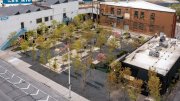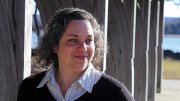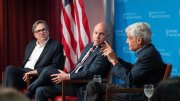On camping trips in northern Ontario as a Boy Scout, David Charbonneau, Ph.D. ’01, Cabot associate professor of astronomy, remembers looking up and watching the stars. “I’d lie on my back with a little star map,” he says, “and try to piece together constellations.” The son of a geologist and a psychiatrist, Charbonneau studied physics, math, and astronomy at the University of Toronto, where he also joined a co-op and applied his scientific acumen to brewing homemade stout. While a graduate student at Harvard, he remained active in co-ops by tutoring at one (through Dudley House) and founding another during a year-long stay in Boulder. In Colorado he also made an important discovery at the High Altitude Observatory. Until 1999, astronomers possessed only indirect evidence of planets in other solar systems, but by measuring the change in a star’s brightness during an eclipse, Charbonneau proved the existence of the planet causing it (see “Distant Planets,” July-August 2000, page 22). That research won him a fellowship to Caltech for postdoctoral study, during which he flew back East on weekends to visit his wife, who was doing her residency at Boston-area hospitals. He joined the Harvard faculty in 2004 and recently received a Packard Fellowship to build eight 16-inch telescopes at the Whipple Observatory on Mount Hopkins in Arizona. His original research turned up only “gas giants”; he will target the new scopes to identify small, rocky planets like our own. “We really are poised,” he says, “to understand whether the solar system is commonplace throughout the galaxy, or whether we’re unique.”
David Charbonneau
David Charbonneau
On camping trips in northern Ontario as a Boy Scout, David Charbonneau, Ph.D. ’01, Cabot associate professor of astronomy, remembers...
You might also like
Mount Vernon, Historic Preservation, and American Politics
Anne Neal Petri promotes George Washington and historic literacy.
Landscape Architect Julie Bargmann Transforming Forgotten Urban Sites
Julie Bargmann and her D.I.R.T. Studio give new life to abandoned mines, car plants, and more.
Preserving the History of Jim Crow Era Safe Havens
Architectural historian Catherine Zipf is building a database of Green Book sites.
Most popular
Explore More From Current Issue

A Forgotten Harvard Anthem
Published the year the Titanic sank, “Harvard’s Best” is a quizzical ode to the University.

Getting to Mars (for Real)
Humans have been dreaming of living on the Red Planet for decades. Harvard researchers are on the case.






